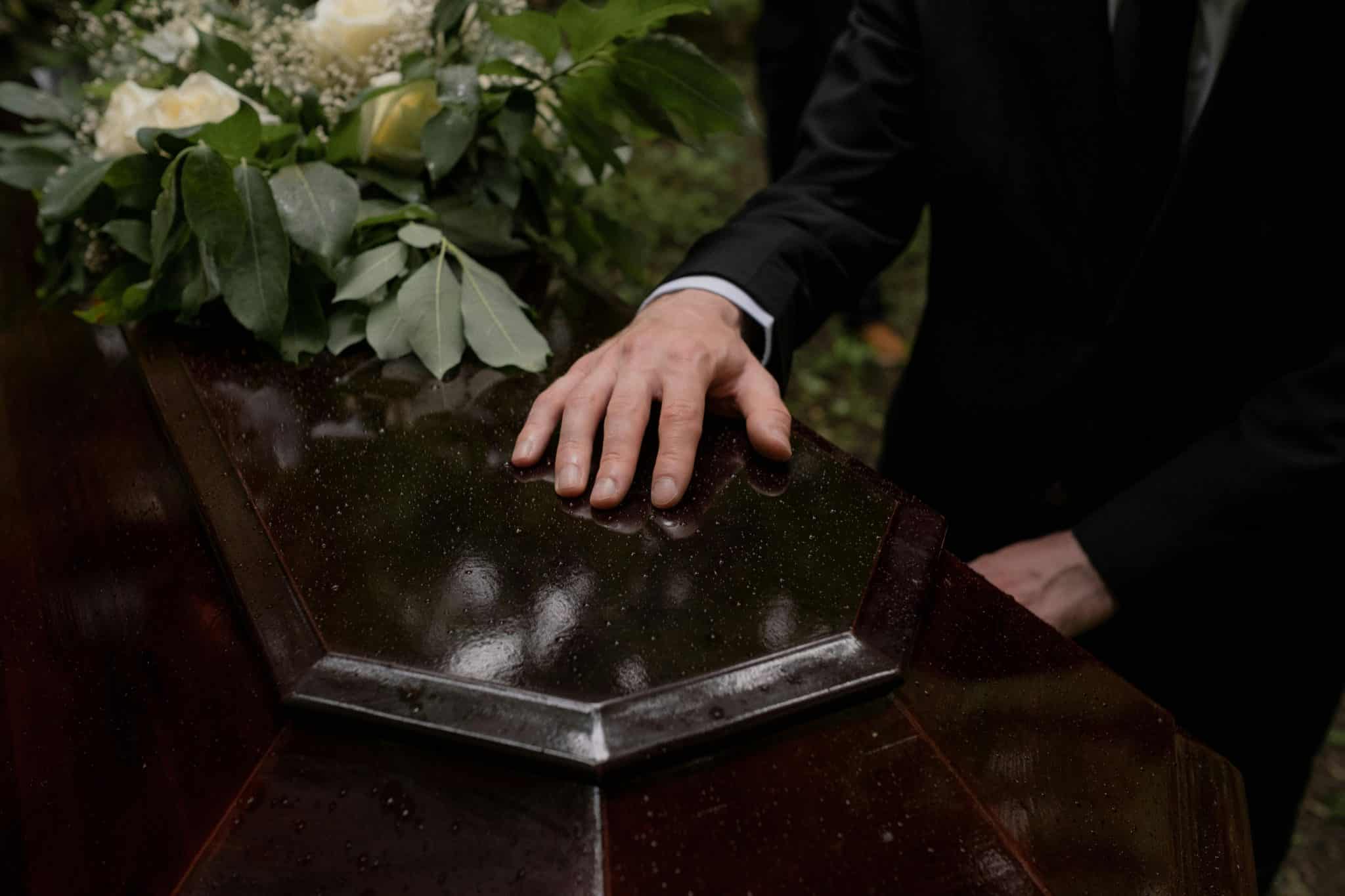Finding quiet after the marathon
Grace Leuenberger for Mockingbird // January 14, 2022, 12:00 am

"In the quiet of my grief, God has shown Himself to be a lot like that finish line volunteer I encountered in my first marathon. At the end of the race with His arms wide open, ready to welcome us – tears, vomit, and all," writes Grace Leuenberger. Photo by Tobias Seidl on Unsplash.
Strong strides, swinging arms, tired-yet-powerful legs propelling myself forward — this is how I imagined myself finishing my first marathon. Imagining how my marathon would go was a strategy I’d used in races before, along with repeating phrases like “I am strong!” when experiencing pain.
Coupled together, these strategies are meant to help runners cope with the mentally gruelling aspect of racing. But as most marathoners can attest, the actual race didn’t go as I’d hoped. I hit The Wall.
Cramps crept up at mile 18 and caused my fantastic finish to be more of a horrific hobble. My marathon ended with me crying into the arms of a finish line volunteer.
Optimistic imagination and a determined strategy can only take one so far in the marathon of grief.
She put a gold medal around my neck. I kissed it. And then I vomited.
After my marathon, my typical reply when people asked how it went was to laugh and say: “It wrecked me!”
I told them about the cramps and the vomit, and posted a photo on Instagram of me smiling atop a platform after the race, holding up my prized gold medal.
“How do you look so adorable even after throwing up, what’s your secret, honey?” one of my friends commented.

The author, Grace Leuenberger, with her medal after the pre-pandemic marathon which she chose to train for during “one of the darkest periods of my life”. Photo courtesy of Grace Leuenberger via Mockingbird.
My friend was joking, but the fact was, I was keeping a secret: The marathon really did wreck me.
The ghost of grief
I trained for my marathon determinedly during the heat of summer, grinding out the miles day after day.
But as my physical body got stronger, my mental and emotional wellbeing began to suffer. I was grieving the recent end of a relationship I’d had very high hopes for, the souring of what was supposed to be a dream job, and the death of my grandpa.
I tried to imagine the positive outcomes and remind myself that I was strong, that every pain could be repurposed.
Once the race was done, in the quiet of my home, I couldn’t pretend I was strong anymore.
But once the race was done and I’d returned to the quiet of my home, I couldn’t pretend I was strong anymore. An optimistic imagination and a determined strategy can only take one so far in the marathon of grief.
The months that followed my marathon were a horrific hobble. In her book Prayer in the Night, Tish Harrison Warren discusses what happens to the woman who runs from her grief, as I literally did in choosing to train for a marathon during one of the darkest periods of my life.
She writes: “If we do not make time for grief, it will not simply disappear. Grief is stubborn. It will make itself heard or we will die trying to silence it. If we don’t face it directly, it comes out sideways, in ways that aren’t always recognisable as grief: explosive anger, uncontrollable anxiety, compulsive shallowness, brooding bitterness, unchecked addiction. Grief is a ghost that can’t be put to rest until its purpose has been fulfilled.”
The stubbornness of my grief haunted me everywhere I went. I cried at church, at home, on walks, on runs, in stores, in parking lots.
At one point, my anxiety even caused me to wet the bed. I stood in a silent stupor in my bedroom at my parents’ house holding the soaked sheets, feeling like a child who didn’t know how this had happened or what to do next. It was bewildering.
Too fast for too long
My strength was the medal I’d proudly worn my whole life. It took running a marathon to expose that what I had thought was a medal turned out to be more like a millstone. Stoicism is not a fruit of the spirit, but I sure had been living like it.
Stoicism is not a fruit of the spirit, but I sure had been living like it.
After months of grinding against my grief, I finally decided it was too heavy to keep carrying, too loud to ignore, too important not to make time for.
I filled out an intake form for counselling, quit my job, and took eight weeks off. It was the most time-off I’d had for over eight years.
During this period, many of my days were very quiet. I passed the time by taking walks or sitting on my couch. Being silent for that long felt much harder than running a marathon.
I had been moving so fast for so long that I hadn’t realised how bad things were, how much I needed help.
Interestingly enough, my marathon of grief began to feel less painful just in time for a new race to begin: The pandemic.
My marathon of grief began to feel less painful just in time for the pandemic.
The pandemic has proven to be another marathon of its own, and my old racing strategies stubbornly reemerged.
In April, I quietly resolved to “make the most of this pandemic”, like it was some kind of strongman endurance challenge that I could win and others could lose.
For me, a medal-worthy pandemic plan included reading more books, becoming more educated, sending mail, making cookies for my neighbours, and calling my grandma.
The problem was: I couldn’t keep it up.
I can never keep it up. It’s not sustainable to remain strong as the world around you runs a horrific race that seems to have no end. I hit a wall in October, then got a second wind in November.
This month, I hit a wall again, crying out to my mom one winter afternoon last week: “This could end, but what if it doesn’t?”
Grief, acknowledged
This week has been another quiet one in my home. My roommate is gone, quarantining elsewhere. In the quiet, I have found myself haunted by that question: “This could end … but what if it doesn’t?”
This pandemic has been full of grief, yet many of us haven’t made time for it or even had time to face it.
I did not expect to get a definitive answer to this question, but on Wednesday, I heard a curious reply: Silence.
During the inauguration (of US President Joe Biden in 2021), there was a moment of silent prayer.
Typically, I am cynical towards any politician’s words and actions, but something about the invitation moved me deeply. In that quiet moment, I began to cry.
This whole pandemic has been full of grief, yet so many of us, myself included, haven’t made time for it or even had time to face it. In our world full of chaos and noise, it’s often hard to find a moment to sit in the silence with our grief and lament our losses.
In America — a country that loves to be strong — it’s even harder.
But as I learned firsthand, not giving our grief the time of day will kill us. We cannot ignore it and carry on, business as usual. This is not business as usual.
“Where can we find light / In this never-ending shade?” asked Amanda Gorman, the now-famous National Youth Poet Laureate.
In that moment of silence, instead of finding peace, my mind raced from grief to grief.
“The loss we carry,
A sea we must wade
We’ve braved the belly of the beast
We’ve learned that quiet isn’t always peace.”
Gorman is right: Quiet isn’t always peace.
The moment of silence that Biden invited America into did not immediately bring my mind to a peaceful place.
My mind raced from grief to grief. I thought about the 400,000 people who have died, and all the tragedies of 2020 and 2021 and years before that, too. I thought about my friends who lost their jobs, and how my church has dwindled in size. I thought about my 91-year-old grandma who lost her husband of 70 years just months before the pandemic. I thought about how quiet this year has been for her.
Where our minds go when we get quiet can bring us to a place where grief nearly wrecks us. But in that moment of quiet, I felt like the Lord was re-inviting me to experience grief differently, to experience it with Him.
Wide open arms
This wrecking was not a reckoning, a test by God to see if we could repurpose our pain. This was a moment whereby God asked us to do what He’s always wanted: To stop and be present with Him.
“Be still and know that I am God,” writes the psalmist (Psalm 46:10).
The losses we carry, the seas we must wade, are never things we must endure alone.
In the quiet of my past and present griefs, God has shown Himself to be a lot like that finish line volunteer I encountered in my first marathon. Whether we have a fantastic finish or a horrific hobble, God stands at the end of the race with His arms wide open, ready to welcome us – tears, vomit and all.
He does not require us to run with award-winning strength, because the good news of the Gospel reminds us that Christ has already braved the belly of the beast. The losses we carry, the seas we must wade, are never things we must endure alone.
It can be hard to find light in this never-ending shade, in this race so many of us are running. But of this I am certain: God was not lying when he promised us that He would never leave us or forsake us (Isaiah 41:10-13).
“Listen to carrion — put your ear close, And hear the faint chattering of the songs that are to come,” Wendell Berry writes.
At this point in our marathon of grief, God’s promises may sound only like a faint chattering. But what if we accepted the invitation to be silent?
Stop.
Be still.
Listen close.
Do you hear it?
This article was first published by Mockingbird and is republished with permission. You can find more articles here.
FOR MORE ARTICLES LIKE THIS:
Lament! President of NCCS exhorts leaders at Pastors Summit 2021
Don’t say “I know how you feel”: Here’s how to be really present for someone who is grieving
We are an independent, non-profit organisation that relies on the generosity of our readers, such as yourself, to continue serving the kingdom. Every dollar donated goes directly back into our editorial coverage.
Would you consider partnering with us in our kingdom work by supporting us financially, either as a one-off donation, or a recurring pledge?
Support Salt&Light



